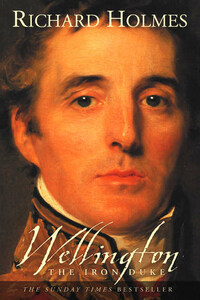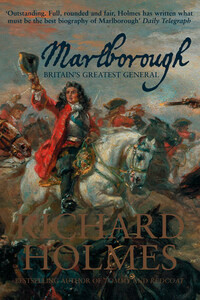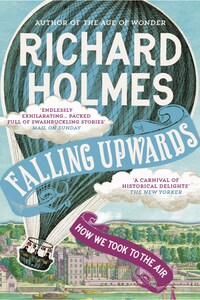I was the sort of boy who had heroes, and long before I ever dreamt of becoming a military historian, the Duke of Wellington was firmly enshrined in my personal pantheon. He seemed to have every virtue: he never lost a major battle, made war on soldiers not civilians, understood grubby logistics just as well as the rather more dashing tactics, and set the seal on his military career by defeating Napoleon, the towering genius of his age. And as someone often forcefully reminded of the couplet;
Duty, duty, must be done
The rule applies to everyone
I admired the dukeâs iron sense of duty. âNobody else will do it,â he complained in his declining years. âThe Duke of Wellington must.â>1 He was a beau, but a restrained one. When my own idea of understated elegance consisted of clean jeans and a black cashmere roll-neck, I applauded the dukeâs eschewing scarlet and gold braid in favour of a trim blue frock coat and the eponymous boots. He was brave, showing physical courage on a dozen battlefields, and moral courage throughout a long political career. Like many young men, I saw bravery as the ultimate virtue. There was also an attraction in his manly vices. What adolescent would not be impressed by a man described by one of Napoleonâs mistresses as a good deal more vigorous than the emperor himself?
Lastly, he was master of the crisp aphorism; something I often sought but rarely found. He told the politician and diarist John Wilson Croker that: âAll the business of war, and indeed all the business of life, is to endeavour to find out what you donât know by what you do; thatâs what I called âguessing what was on the other side of the hillâ.â>2 When a gentleman mistook him for George Jones the painter (who did indeed resemble the duke), and accosted him in the street with âMr Jones, I believe?â he responded: âIf you believe that, youâll believe anything.â>3 The young Queen Victoria was upset to discover that sparrows were ruining the exhibits in the Great Exhibition of 1851, but could not be shot because the great building was made of glass. âTry sparrow-hawks, Maâam,â suggested Wellington. And when a publisher demanded payment to avoid Wellington being mentioned in the memoirs of a former mistress, he riposted: âPublish and be damned.â>4 Even though he sometimes reviled his men as âthe scum of the earthâ, his essential compassion burst out when he admitted after Waterloo that: âNothing except a battle lost can be half so melancholy as a battle won.â
But as I grew older and looked harder at the evidence, there were an awful lot of cracks in the ducal portrait. Wellington was not invincible. He was roundly beaten in a scrambling night attack at Sultanpettah Tope outside the Mysore fortress of Seringapatam in 1799 â it left such a lasting impression on him that, forty years later, he could still draw a sketch-map of the action. Critics suggested that he might have been court-martialled had his brother not been governor-general of India at the time, and this was not the last occasion when his well-placed political connections proved useful. In 1812 he botched the siege of Burgos â âthe worst scrape that ever I was inâ â and on the retreat he railed against âthe habitual inattention of the Officers of the regiments to their dutyâ, leaving many of them with lasting resentment of his ingratitude.>5 Indeed, Lieutenant William Grattan of the 88>th Regiment (Connaught Rangers) complained that âthe never-to-be forgotten service of that wonderful armyâ was treated âin a scandalous mannerâ by Wellington.>6 Ensign John Mills of the Coldstream Guards thought that his dispatches were dishonest:
I have learnt one thing since I came to this country, and that is to know how easily England is duped; how completely ignorant she is of the truth of what is going on here ⦠At Fuentes the French completely turned our right; Lord Wellington in his dispatch slightly notices it, and would lead you to think that the troops on the right were withdrawn rather than, as was the case, driven in; and then they give him what he himself never dreamt of claiming, a victory.>7
Wellingtonâs reprimands were scathing and not always just. In 1811, Lieutenant Colonel Bevan of the 4>th Regiment was so distressed by being unfairly blamed by the duke for the escape of the French garrison of Almeida that he shot himself. He was also something of a snob, preferring talent with a title to talent without. He often privately expressed contempt for his allies, and the German historian Peter Hofschröer has established at least a prima facie case against him for dealing dishonestly with the Prussians at Waterloo. A strong thread of harshness ran through his character: Paddy Griffith observed that he âcould be a ferocious commander even by the standards of a ferocious profession in a ferocious ageâ. In 1813 he told a subordinate at the siege of Pamplona that âyou may shoot the governor and his officers, and decimate the rank and fileâ, and he regretted not shooting the garrison of Ciudad Rodrigo when he stormed the place in 1812 (technically permissible within the laws of war as they then stood), because killing one garrison would have discouraged others.














